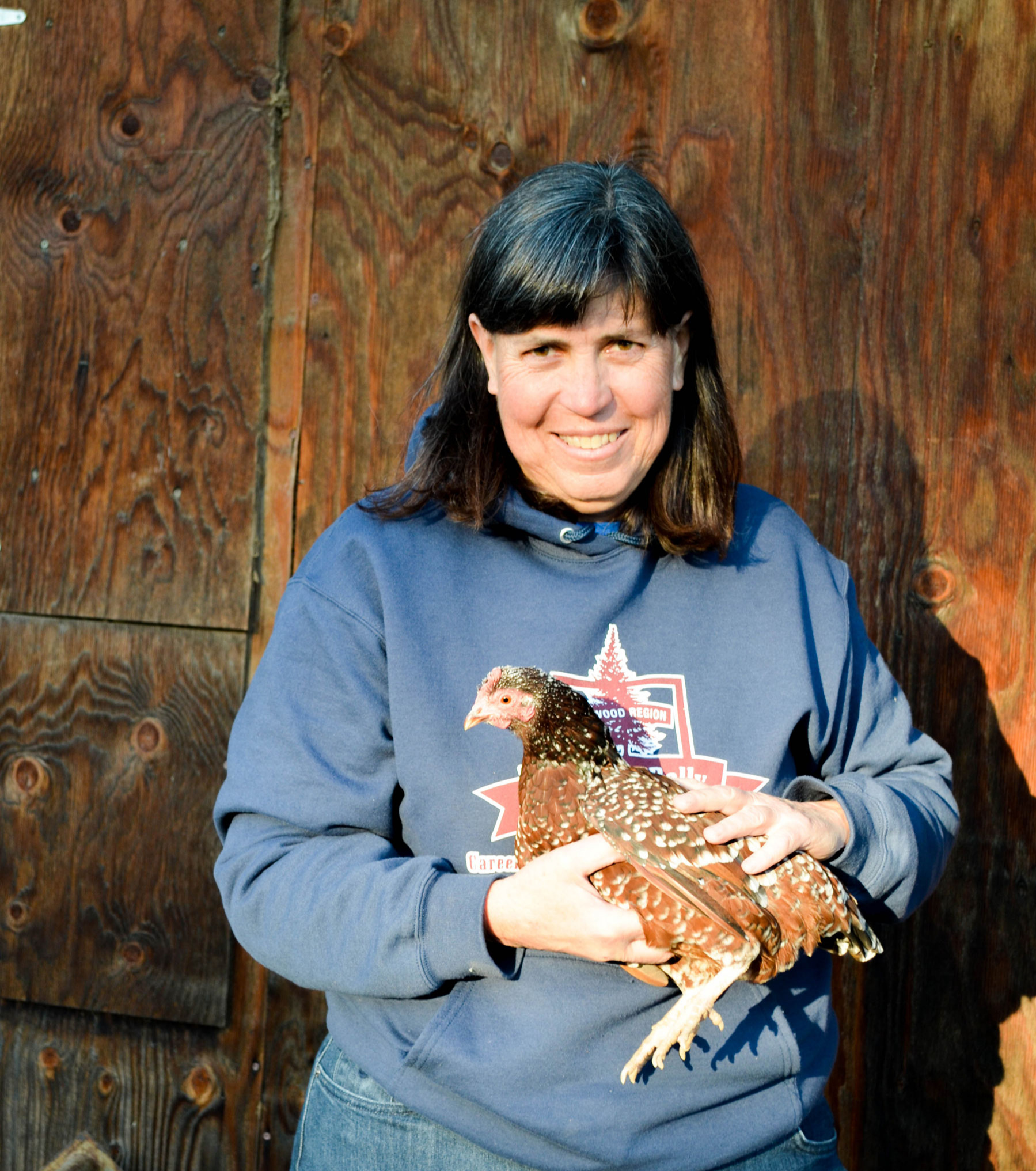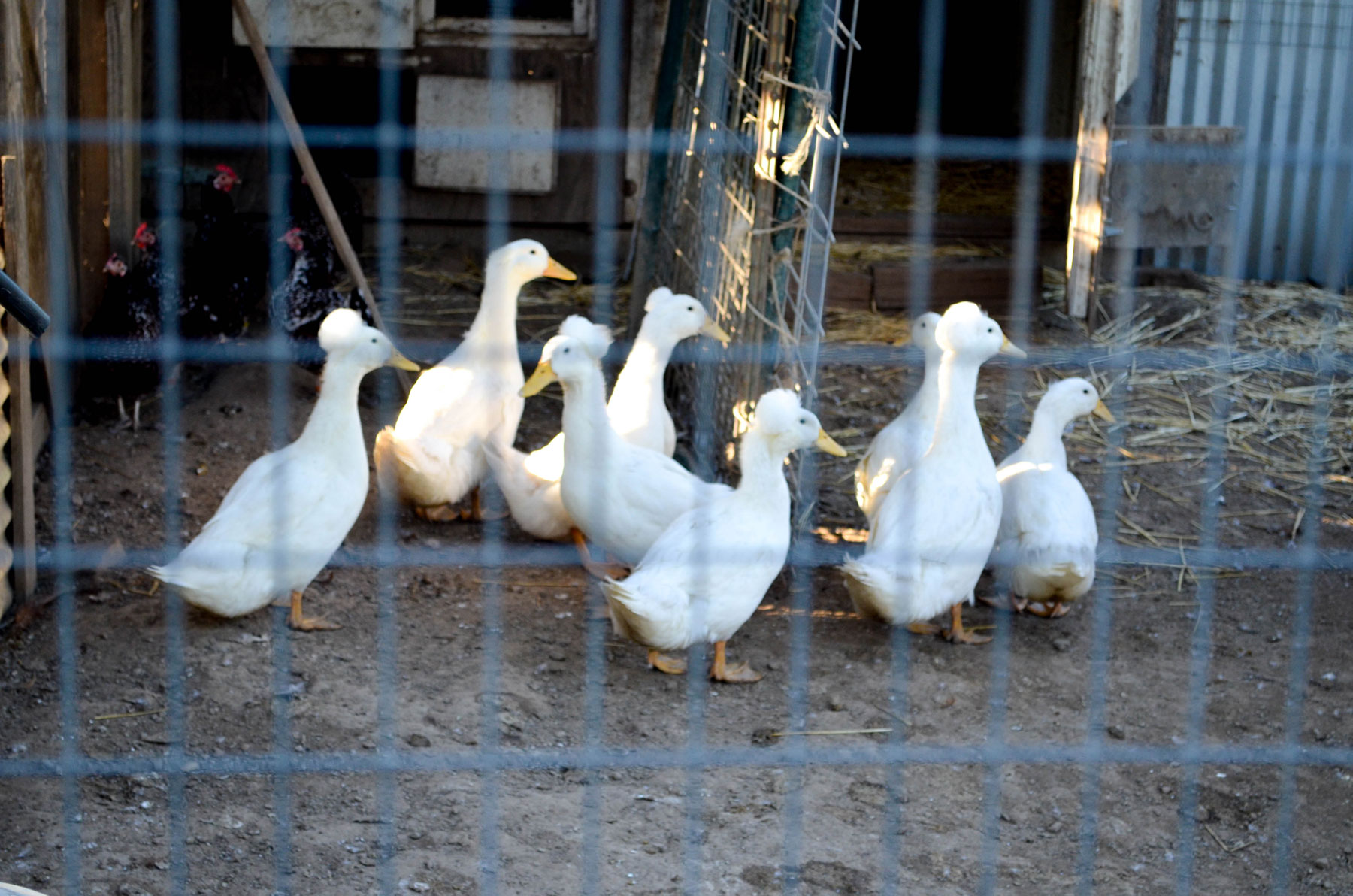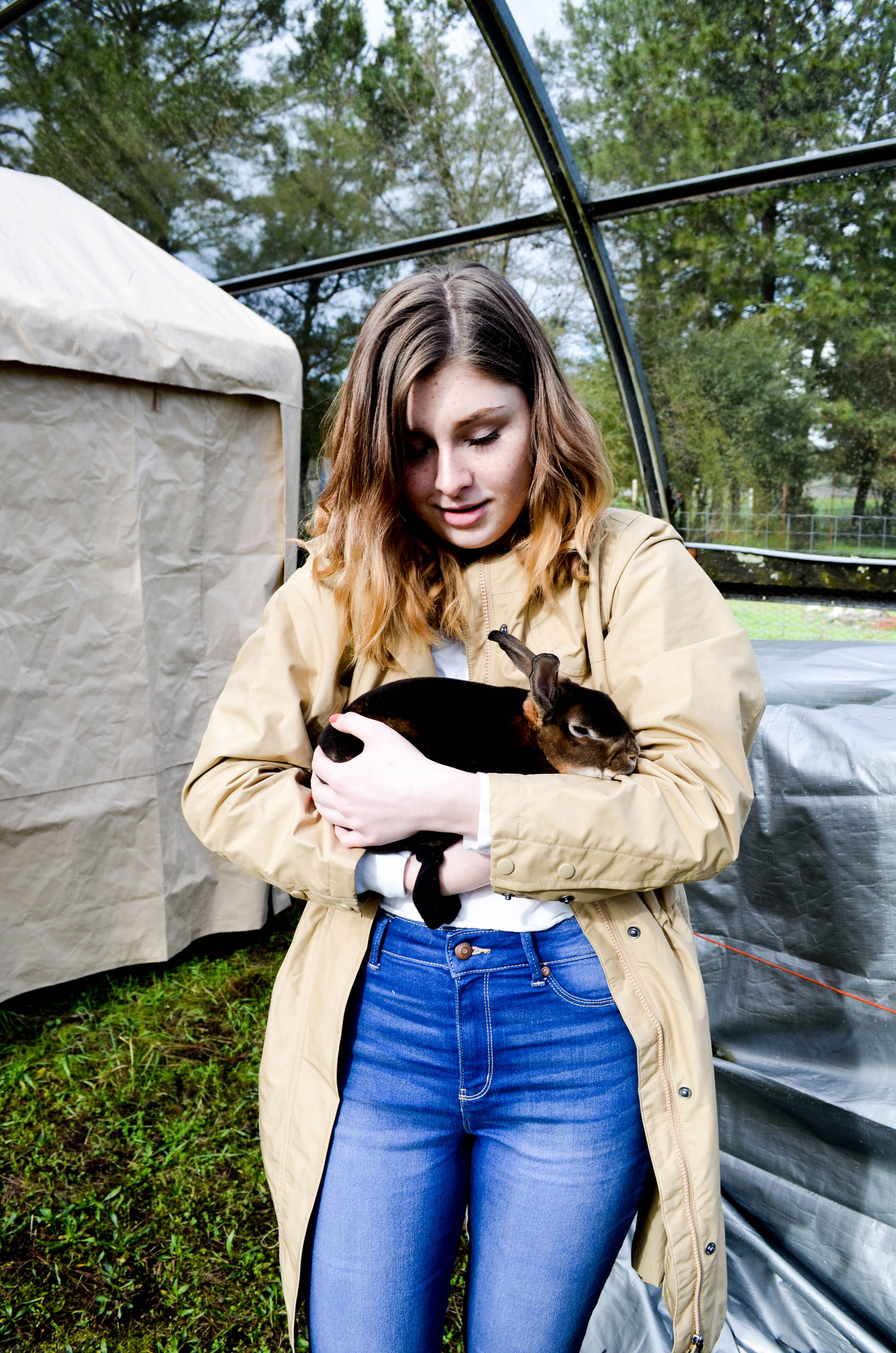Beth Swehla

& the Anderson Valley High Agricultural Education Program
by Torrey Douglass
To truly grasp a concept, there is no substitute for direct experience. Although the benefits of hands-on, project-based learning has been recognized by educators for a long time, it has risen to new popularity in recent years as schools focus on STEM subjects (Science, Technology, Engineering, and Math) in an effort prepare students for 21st century jobs. Hearing a teacher discuss how to plant a garden is one thing. Going outside and putting your hands in the dirt is entirely different, and offers a much better method for understanding what gardens are all about.
It’s just that kind of outdoor getting-your-hands-dirty work that is most satisfying to agriculture teacher, farm manager, and FFA advisor Beth Swehla. Beth began working at Anderson Valley Junior and Senior High School the summer of 1989. She was hired to manage the 7-acre farm, maintaining and improving facilities, watering gardens, and supervising student projects. At the time, the program was nationally known, employing two ag teachers and a secretary, as well as the farm manager. Exchange students would come from other countries to participate. Within a couple of years, Beth began teaching part-time, and while you could say she’s been working in the classroom ever since, she’s actually been working outside of it as much as possible.
“I’m not a fan of paperwork. I like to be outside with kids doing stuff—I like the hands-on, active learning,” Beth muses. She thinks of the agricultural education program as “the original STEM education,” where students pick a destination and Beth helps them get there. Earlier in the year, two of her 11th graders wanted to start a fall garden. It was too late to put seeds in the ground, and Beth didn’t have any young plants, so she reached out to the agriculture instructor at Mendocino College in Ukiah, Jim Xeangeanes. A day or two later, the students and Beth drove over to Ukiah to visit Jim. They came back with the bed of the pickup full of donated seedlings—more than enough for their gardens—and got a tour of the college’s new hoop houses to boot.
The gardens the juniors planted represent one circle in the three circle model that comprises the ag program at Anderson Valley Junior/Senior High School: Future Farmers of America (FFA), classroom teaching, and Supervised Ag Experiences (SAE). FFA guides students in moving up levels by earning degrees through various activities, focusing on leadership skills, character development, and preparation for careers in agriculture, like practice job interviews. The organization currently has 80,000 members in California, and the highest level a student can reach is the state FFA degree. Students who achieve this are like the Eagle Scouts of FFA.
Supervised Agricultural Experiences are another aspect of the model, and this is where the hands get dirty, quite literally. The 6’ x 8’ gardens her students will each plan, plant, and care for this spring qualify as SAEs, as did the gardens of her two 11th graders. (Bonus: Getting kids to eat vegetables is a lot easier when they’ve grown them on their own.) These projects can also happen over the summer and include anything from running a lawn mowing business, working at the local feed store, or raising chickens or other farm animals to show at the Redwood Empire Fair in August. If a student expresses interest in a particular project for their SAE, Beth will go to great lengths to put the tools and materials in their hands to make it happen.
The one thing she won’t do is the actual work—that’s up to the students. The farm has fenced pasture, livestock barns, and chicken coops where the students can house their animals. There are tools, equipment, and most importantly, the experience and knowledge of Beth herself. But the students need to show up every day to care for their farm goat, sheep, or chickens.
Beth has been teaching in the ag program for thirty years and does what she can to keep things fresh. Gone are the days when an ag program enjoyed the staff and support it had when she started, and just in the last couple of years the farm manager position was axed as well, leaving Beth to run the program on her own. Fortunately, there is an extensive online community of ag teachers from across the country she can turn to—there’s even a podcast specific to this particular group of educators. Still, it’s a lot of work. “We could work 100 hours a week and still not get it all done,” she says. But she does what she can, and to hear her start listing the various fundraisers and service projects, the SAEs and field trips, it’s no small amount.
One way Beth gets so much done is by tapping into a strong local network of ag teachers and professionals. Her generous attitude toward sharing resources and knowledge turns out to be typical of those teaching in her field. “I know all of the ag teachers in this county and the counties around us. I don’t think teachers in other disciplines could say the same for their colleagues at other schools. We’re always talking, sharing ideas—it’s a big help.” Due to the wide variety of projects students pursue, that network comes in handy for answering questions about anything from irrigation systems and pest control to how to help a goat give birth. It’s also great if you need to call up the head of the department of Agriculture at Mendocino College for some plant starts.
What seems to drive Beth’s high commitment to her students is the joy of expanding their worldviews and showing them how capable they are. “The program changes kids’ lives,” says Beth. “The more involved they are, the more it changes them. It gets them out of this tiny town and teaches them skills, like how to use a t-post puller.” To illustrate, she pulls out her phone to share a video of a group of boisterous seventh graders circled around a t-post with the aforementioned t-post puller in their hands. They try various ways to get that post out of the ground, but the device is not exactly intuitive. Beth stands back, occasionally giving tips but mostly staying out of their way as they experiment. The kids talk to each other, sharing turns and giving suggestions, and finally the post is pulled free as the kids step back, looking satisfied.
Not a lot of curriculums get kids outside to find out how a t-post puller works. The ag program is a place where students who might not thrive in the traditional classroom setting can stretch their proverbial wings. Kids who think they aren’t artistic take Beth’s floral design class and discover they can make beautiful arrangements. Those who join the lambing and kidding crew get pulled out of other classes to help a goat birth her kid (and, believe me when I tell you, after seeing the video, that is truly a HANDS ON task). They travel around the state for FFA gatherings and get together on a Saturday in late October to bake hundreds of cookies that are frozen so they can be added to the food bank’s Thanksgiving boxes. They plant seeds. They submit veggies in the county fair and make wreaths and centerpieces in December. They sell flowers to the student body for Valentine’s Day and work the plant sale on Mother’s Day. It's a busy scene.
Beth is one of those rare people who heard her calling at a young age. Although her dad worked for the telephone company, he was also an avid gardener at their home in Fort Bragg, teaching Beth the joys of planting and harvesting. She joined the Fort Bragg FFA, where she fell in love with ag education, and later attended Fresno State for ornamental horticulture and plant science. Now with thirty years' experience behind her, she’s not showing any signs of slowing down. AV FFA hosted 150 FFA members in January for a speaking contest, the goats began birthing in February, the sheep in March, and not long after the Mother’s Day plant sale will help raise funds for the program in May. Did I mention it's a busy scene?
Beth's work has not gone unnoticed. At the 2014 National FFA Convention in Louisville, KY, she was awarded the Honorary American FFA Degree. In 2018, she won two awards from the California Agricultural Teachers Association: one for Mendo-Lake Section Outstanding Single Person Department and another naming her a Mendo-Lake Section Teacher of Excellence. While it’s nice to get recognized, her motivations run a little deeper, and it’s fair to say her career has embodied the FFA motto:
Learning to Do, Doing to Learn,
Earning to Live, Living to Serve.
Torrey Douglass is a web and graphic designer living in Boonville with her husband, two children, and a constantly revolving population of pets and farm animals.




